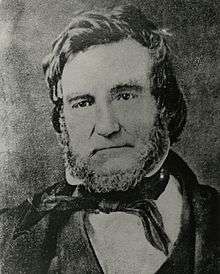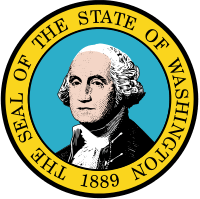William Pickering (governor)
| William Pickering | |
|---|---|
 | |
| 5th Territorial Governor of Washington | |
|
In office June 1862 – January 8, 1867 | |
| Preceded by | William H. Wallace |
| Succeeded by | George E. Cole |
| Personal details | |
| Born |
March 15, 1798 Yorkshire, England |
| Died |
April 22, 1873 (aged 75) Albion, Illinois |
| Political party | Republican |
| Spouse(s) | Martha Flower (1800–1838) |
William Pickering (March 15, 1798 – April 22, 1873) was a Republican and the fifth governor of Washington territory, from (1862 – 1866).
Pickering was born in Yorkshire, England.
He graduated from Oxford University in 1820. The following year he moved to Edwards County, Illinois, acquiring property and involving himself in various businesses in the area of Albion, Illinois. On 9 March 1824 in Albion he married Martha, daughter of Richard Flower and sister of Edward Fordham Flower.[1] They had five children, who in turn have left many descendants, before she died on 28 December 1838.[2] He never remarried.
He served in the Illinois House of Representatives from 1842 to 1852[3] and was a delegate to Republican National Convention from Illinois, 1860. In 1862 President Lincoln offered him the choice of being either part of the United States Ministry in England or Governor of the Washington territory, known at the time as the territory of Columbia. Pickering chose the governorship, and he moved to the territorial capital, Olympia, in June 1862, and served as governor until 1866. On September 4, 1864, he sent the first message over a transcontinental telegraph line. Under the leadership of Territorial Governor William Pickering, state government took responsibility for the care of the mentally ill. Lacking funds to build a hospital, the state contracted for the care of the mentally ill with the Sisters of Charity (now the Sisters of Providence), but, because of lack of funds, it was 19 months before the Sisters began to receive payment.[4]
Pickering was an active member of St. John's Episcopal Church (Olympia, Washington), serving in a leadership role in its founding as a parish in 1866.[5]
After his term, he moved back to Illinois, where he died in 1873.
References
- ↑ George Flower « On the 9th day of March, 1824, Mr. Pickering became my brother-in-law by marriage with my eldest sister, Miss Martha Flower » cited in Illinois State Historical Society (2013). pp. 492-3. Journal, 1917 (Vol. 9). London: Forgotten Books. (Original work published 1917) http://www.forgottenbooks.com/readbook_text/Journal_1917_v9_1000600439/539 retrieved 22 October 2015
- ↑ Edwards County Historical Society "Cemetery Inscriptions of Edwards County, Illinois" Vol. 1 cited at http://www.findagrave.com/cgi-bin/fg.cgi?page=gr&GRid=103691021 retrieved 22 October 2015
- ↑ "Journal of the Illinois Historical Society," vol. 9, 1917, pg. 493
- ↑ About DSHS - A History of Human Services
- ↑ Laws, Jean (October 2009). "Highlights from a History of St. John's Episcopal Church, Olympia, Washington". XXXV (4). Olympia Genealogical Society.
Further reading
- Meany, Edmond S (1915). Governors of Washington : territorial and state. University of Washington,.Available online through the Washington State Library's Classics in Washington History collection
